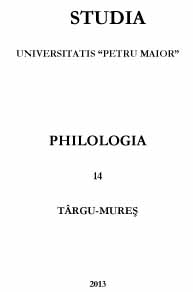FENOMENE SEMIOZICE ÎN DISCURSUL ESEISTIC LOGICA IDEILOR VAGI. ANALIZĂ TEXTUALĂ
Semiosic Phenomena in the Essaystic Discourse. The Logic of Vague Ideas. Textual Analysis.
Author(s): Luminiţa ChioreanSubject(s): Language and Literature Studies
Published by: Editura Universităţii Petru Maior
Keywords: textual semiosis; discours essayistique; emotional/ dynamic/ final(logic) interpreters; R-text
Summary/Abstract: In reading Stanescu’s essay, we used textual semiosis (Carmen Vlad, 2000). In the spirit of a new order in the analysis of discourse in the essays, we chose the linguistic and semiotic codes. The semiosic model applied to the essay The Logic of Vague Ideas / Logica ideilor vagi confirms the architecture of discourse in the essay. Nevertheless: there is a bi-univocal relation between the nature of the interpreter and the discursive stages or reason, therefore: the emotional interpreter is the equivalent of textuality (Vlad); the dynamic interpreters correspond to the essayistic rationality (in the demonstration or the experiment) and the final (logic) interpreter “archives” the textual meaning. We remind only a few of the observations made in the analysis of the essayistic discourse as a semiosic process (Peirce, Vlad): (1) The R-text was played as a discursive support for the interpreters, by this signifying function mediating the relation between the object and the interpreter (immediate object = idea of real, here: the word; dynamic object = real, here: poetic metalanguage); in Stanescu’s essay, (2) Ii1 = the word defined by the lexemes „understood” and „well-understood”; (3) Id1=”the understanding” corresponds to the proper meaning, to denotation, and the „well-understood” to the named object (thing), to connotation. (4) the lexemes support, co-textually and contextually, mainly the metaphorical nature of the word, etc. As a conclusion, the logic interpreter confirms the metalanguage on each level: [1] metaword, [2] metalanguage, [3] metapoetic language (metatext).
Journal: Studia Universitatis Petru Maior. Philologia
- Issue Year: 2013
- Issue No: 14
- Page Range: 28-41
- Page Count: 14
- Language: Romanian

